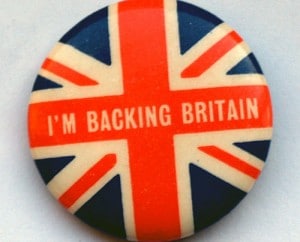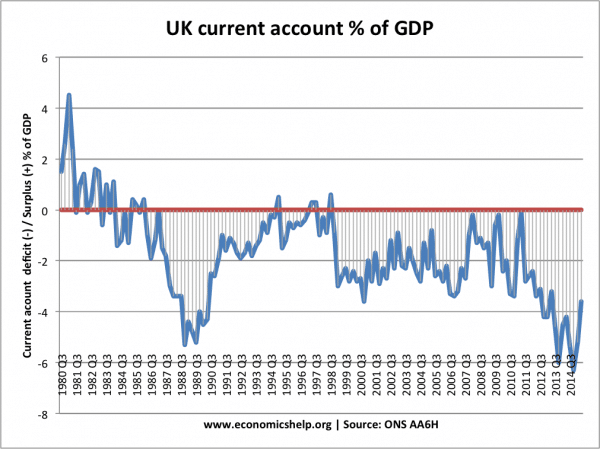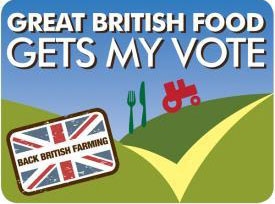
It is a form of economic nationalism and similar campaigns can be seen in many different countries. Buy British campaigns can make more difference when they are targeted at particular industries, such as farming, steel.
Examples of Buy British Campaigns
- 1930s A ‘Buy British’ campaign was launched by the Conservative-dominated National Government shortly after its election victory in 1931. The backdrop of this campaign was the Great Depression, and rising tariff duties as declining trade and rising unemployment made people more conscious of ‘protecting’ domestic industries.
- In 1968, a ‘Buy British’ campaign was started. It received backing from the government and led to a proliferation of British flags on British marked goods. It also involved some people volunteering to work an extra half an hour a day without pay. The 1960s was considered a period of economic malaise in the UK – with large current account deficit (which then was a major political concern) In 1967, the government had been forced to devalue the Pound by 14% in response to the Pounds weakness. The campaign received widespread media coverage, but generally fizzled out without making any significant changes. It
- 1980s / 90s. Buy British agriculture more targeted campaigns to support British farmers visible in supermarkets.
- 2016 – Buy British Steel in response to decline of British steel industry in face of Chinese competitors.
Motivations for Buy British campaigns

Balance of payments – current account deficit. A current account deficit means the value of imports (goods + services) is greater than the value of exports. If people can be encouraged to switch from foreign imports to domestic production, you can improve the current account without recourse to devaluation or reducing consumer spending.
Domestic jobs. Buying British goods supports British industries and helps protect / create jobs in UK rather than spending money abroad.

Retaliation against unfair competition. If agricultural markets were flooded with cheap imports from countries ‘dumping’ their surplus, there would be a case to avoid these cheap imports and buy British products. For example, some argue the Chinese steel industry has unfairly engaged in over-supply causing prices to plummet below cost. In response to this, there is a case for British industry to buy British steel rather than reward those firms / countries trying to gain
Prevent foreign companies gaining monopoly. There may be strategic reasons to keep a domestic industry going. A foreign multinational could flood the market with cheap imports causing domestic industry to go out of business. But, then we are captive to a foreign monopoly who can push up prices at a later stage. Buying British and supporting domestic industry can avoid this threat of foreign monopoly.
Problems of Buy British Campaigns
Supports uncompetitive industries. The problem with the Buy British campaign of the 1960s and 1970s was that many British industries were not producing competitive goods. An example, is the British car industry. People who bought British cars, like British Leyland found they were more unreliable and broke down.You could argue the Buy British campaigns of the 1960s were followed by British car becoming the butt of jokes by comedians in the 1970s. Buy British is OK, but if your car breaks down, you would rather buy an import than have a broken down car.
Also, If people keep buying from uncompetitive industries, then the industry has less incentive to improve efficiency and overcome its problems. If we lose comparative advantage in an industry, it may be better to let the industry go out of business to allow resources and labour to move to industries where there is a new comparative advantage.
Free rider problem. If everybody bought more British goods and less imports, the current account deficit would improve and living standards rise. However, as an individual consumer you have a motivation to free ride on the choices of other people. The best is if other people buy British, but you get to choose a Japanese import. (Free rider problem)
Hard to alter consumer behaviour. It’s hard to alter consumer behaviour. If you stop people in a supermarket and ask a shopper if they are happy to pay an extra 5% to support British farmers, the majority probably will. But, for other industries, we don’t feel the same loyalty.
What do we mean made in Britain? Also, it is hard to know the nationality of goods and services because many cars are produced in several different countries. Most goods are now produced in more than one country.. Also, major British industries are often owned by foreign companies. Nissan and Mini are British factories, but owned by Japanese and German owners. Are we buying British if we buy a mini or Nissan car.
Fair trade. Under EU rules, there is legislation to prevent unfair competition for domestic industries. It means we can’t favour a British industry over another European firm. The advantage works for British firms bidding for contracts in the rest of Europe.
Related

i hope all the supermarkets take note i take my wife to aldi or lidl for our shopping because most of them bye trucks from abroad not from the uk just like them i spend my cash on foreign goods not at asda or tesco or the coop spar or morrisons and sainsbury thay do not think about us ?
There’s a lot of unnecessary importing going on every day. It never ceases to amaze me how much French water we import. And yet if the purchasers of said water did a blind taste test with UK water I’ll bet many would get their responses wrong. Just making basic choices to buy locally when there is an equivalent product made in the UK to one made abroad would make a notable difference. In most instances it would be better for the environment as well. It’s probable that people either don’t know where to look to get the information on where products are made or just don’t think about it. There are websites such as madeintheuk.info , letsbuybritish.co , makeitbritish.co.uk that list out UK made products in their different categories.
As further information has come to light regarding the amount of borrowing H M Government have had to arrange due to Covid 19, I think now is the time for the British Public to Buy British products only. There is a danger that as we emerge from this dreadful period, and shops re-open our spending will only benefit foreign companies and countries. BUY BRITISH!